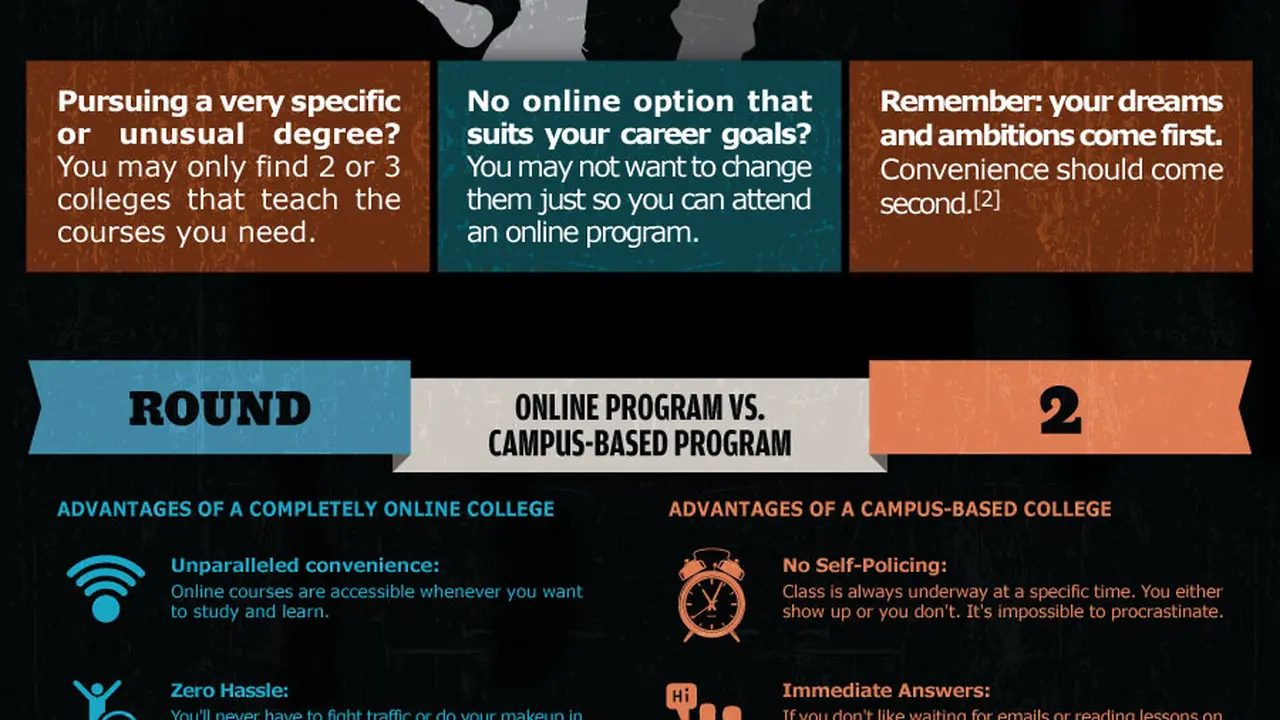Comparing Online Degrees vs Professional Certifications
Compare online degrees vs professional certifications. Understand the benefits of each for your career and educational path.

Compare online degrees vs professional certifications. Understand the benefits of each for your career and educational path.
Online Degrees vs Professional Certifications Which Path is Right for Your Career
Hey there, future-proof professional! Ever found yourself at a crossroads, wondering whether to dive into a full-blown online degree program or snag a professional certification? It's a common dilemma in today's fast-paced world, where continuous learning isn't just a buzzword, but a necessity. Both online degrees and professional certifications offer fantastic avenues for skill development and career advancement, but they serve different purposes and cater to different needs. Let's break down the pros and cons, explore some real-world examples, and help you figure out which path aligns best with your ambitions and lifestyle.
Understanding Online Degrees Comprehensive Academic Journeys
When we talk about online degrees, we're generally referring to bachelor's, master's, or even doctoral programs delivered entirely or predominantly through digital platforms. These aren't just a few courses; they're comprehensive academic journeys designed to provide a deep, theoretical, and often interdisciplinary understanding of a subject. Think of it as getting the full university experience, but from the comfort of your home, coffee shop, or wherever you have an internet connection.
Benefits of Online Degrees Long Term Career Growth and Academic Depth
One of the biggest draws of an online degree is the academic depth it offers. You're not just learning a skill; you're understanding the 'why' behind it, the historical context, the theoretical frameworks, and how it connects to broader fields. This comprehensive knowledge can be incredibly valuable for roles that require critical thinking, problem-solving, and a holistic understanding of complex issues. For instance, an online MBA doesn't just teach you about marketing; it delves into finance, operations, strategy, human resources, and leadership, preparing you for senior management roles.
Online degrees also carry significant weight in the job market, especially for certain professions. Many industries, like healthcare, law, and education, often require specific degrees for entry or advancement. A bachelor's degree is still a baseline requirement for many professional positions, and a master's can open doors to leadership and specialized roles. Furthermore, an online degree from an accredited institution holds the same academic value as its on-campus counterpart, making it a globally recognized credential.
Another often-overlooked benefit is the networking opportunities. While it might seem counterintuitive for an online program, many universities foster vibrant online communities, discussion forums, and virtual group projects. You'll connect with peers from diverse backgrounds and locations, expanding your professional network in ways you might not on a traditional campus.
Challenges of Online Degrees Time Commitment and Financial Investment
Let's be real, online degrees are a significant commitment. They demand a substantial amount of time, often several years, and require a high level of self-discipline and motivation. Juggling coursework with work, family, and other responsibilities can be tough. It's not a sprint; it's a marathon.
Financially, online degrees can also be a hefty investment. While they might save you on commuting and relocation costs, tuition fees can still be substantial. It's crucial to research financial aid options, scholarships, and employer tuition reimbursement programs to make it more manageable.
Popular Online Degree Programs and Providers
Many reputable universities now offer excellent online degree programs. Here are a few examples:
- Arizona State University (ASU Online): Known for its wide range of online bachelor's and master's degrees in fields like business, engineering, and education. ASU Online is consistently ranked among the top online programs for quality and accessibility.
- University of Florida (UF Online): Offers a growing portfolio of online undergraduate and graduate degrees, particularly strong in areas like computer science, public relations, and criminology.
- Western Governors University (WGU): A competency-based online university, WGU is popular for its flexible, affordable, and career-focused bachelor's and master's degrees in IT, business, education, and healthcare. Their model allows you to accelerate your learning if you can demonstrate mastery.
- University of London Online: For a more international flavor, the University of London offers a variety of online degrees, including highly respected programs in economics, management, and computer science, with academic direction from its constituent colleges like LSE and Goldsmiths.
Pricing: Tuition for online degrees varies wildly depending on the institution, program, and your residency status. A bachelor's degree can range from $30,000 to over $100,000, while a master's might be anywhere from $15,000 to $80,000 or more. Always check the specific program's website for detailed tuition and fee schedules.
Exploring Professional Certifications Targeted Skill Acquisition and Career Boost
Professional certifications, on the other hand, are typically shorter, more focused programs designed to validate specific skills or knowledge in a particular area. They're often industry-recognized and demonstrate proficiency in a practical, in-demand skill. Think of them as laser-focused training that gets you job-ready for a specific task or role.
Benefits of Professional Certifications Rapid Skill Development and Employability
The biggest advantage of certifications is their speed and direct applicability. You can often complete a certification in a few weeks or months, making it ideal for quickly acquiring new skills, upskilling for your current role, or reskilling for a career change. They're designed to be practical, focusing on tools, techniques, and methodologies directly used in the workplace.
Many certifications are highly valued by employers because they demonstrate a proven ability to perform specific job functions. For example, a Project Management Professional (PMP) certification tells employers you're proficient in project management methodologies, while a Google Ads certification shows you can effectively manage online advertising campaigns. These can significantly boost your employability and earning potential in specialized roles.
Certifications are also generally more affordable than degrees, making them a great option for budget-conscious learners or those looking to test the waters in a new field without a huge financial commitment.
Challenges of Professional Certifications Niche Focus and Longevity
While certifications are great for specific skills, their niche focus can sometimes be a limitation. They might not provide the broad foundational knowledge that a degree offers, which could be important for long-term career growth into leadership or highly strategic roles. Some certifications also require periodic renewal, meaning ongoing effort and cost to maintain your credential.
The value of a certification can also fluctuate with industry trends. A certification in a rapidly evolving tech field might become outdated faster than a foundational degree. It's important to choose certifications that are widely recognized and have a strong industry backing.
Popular Professional Certifications and Providers
The world of professional certifications is vast and ever-growing. Here are some of the most popular and impactful ones, along with their typical use cases and providers:
Project Management Certifications PMP and CAPM
- Project Management Professional (PMP) Certification: Offered by the Project Management Institute (PMI), the PMP is globally recognized and highly sought after for experienced project managers. It validates your ability to lead and direct projects and is often a prerequisite for senior project management roles.
- Certified Associate in Project Management (CAPM): Also from PMI, the CAPM is ideal for entry-level project practitioners or those looking to gain foundational project management knowledge. It's a great stepping stone to the PMP.
Use Case: Leading complex projects, managing teams, ensuring project delivery on time and within budget. Essential for roles like Project Manager, Program Manager, or Portfolio Manager.
Providers: Project Management Institute (PMI) directly, with many authorized training partners offering prep courses (e.g., Simplilearn, Coursera, edX).
Pricing: PMP exam fee is around $555 (non-members) / $405 (members). CAPM exam fee is around $300 (non-members) / $225 (members). Prep courses can range from a few hundred to a couple of thousand dollars.
Digital Marketing Certifications Google and HubSpot
- Google Ads Certifications: Google offers various certifications (Search, Display, Video, Shopping, Measurement) that validate your expertise in managing Google advertising campaigns. These are free to take and highly practical.
- Google Analytics Certification: Demonstrates proficiency in using Google Analytics to track website performance and user behavior. Also free and invaluable for anyone in digital marketing or web development.
- HubSpot Academy Certifications: HubSpot provides a wide array of free certifications in inbound marketing, content marketing, email marketing, SEO, social media, and sales. These are excellent for building a foundational understanding of modern marketing strategies.
Use Case: Running effective online advertising campaigns, analyzing website traffic, developing content strategies, managing social media. Crucial for Digital Marketing Specialists, SEO Analysts, Content Marketers, Social Media Managers.
Providers: Google Skillshop, HubSpot Academy.
Pricing: Mostly free for the certifications themselves. Paid courses or bootcamps that prepare you for these can vary.
IT and Cybersecurity Certifications CompTIA and (ISC)2
- CompTIA A+: A foundational certification for IT support professionals, covering hardware, software, networking, and security. It's often a starting point for an IT career.
- CompTIA Network+: Validates essential knowledge and skills needed to design, configure, manage, and troubleshoot wired and wireless networks.
- CompTIA Security+: A globally recognized certification that validates baseline skills necessary to perform core security functions and pursue an IT security career.
- Certified Information Systems Security Professional (CISSP): From (ISC)², the CISSP is a highly respected and advanced cybersecurity certification for experienced security professionals. It's often required for senior security roles.
Use Case: IT support, network administration, cybersecurity analysis, information security management. Essential for IT Support Specialists, Network Administrators, Cybersecurity Analysts, Security Engineers.
Providers: CompTIA, (ISC)². Many online learning platforms (e.g., Cybrary, Pluralsight, Udemy, edX) offer courses to prepare for these exams.
Pricing: CompTIA exam vouchers typically range from $200-$400 per exam. CISSP exam is around $749. Prep materials and courses can add significantly to the cost.
Data Science and Analytics Certifications IBM and Google
- IBM Data Science Professional Certificate (Coursera): A comprehensive program covering Python, SQL, data analysis, machine learning, and data visualization. It's a great entry point into data science.
- Google Data Analytics Professional Certificate (Coursera): Focuses on foundational data analytics skills, including data cleaning, analysis, visualization, and using tools like SQL, R, and Tableau.
- Microsoft Certified Azure Data Scientist Associate: For those working with Microsoft's cloud platform, this certification validates skills in applying machine learning and AI solutions on Azure.
Use Case: Analyzing data, building machine learning models, creating data visualizations, working with big data. Ideal for Data Analysts, Data Scientists, Business Intelligence Analysts.
Providers: Coursera (in partnership with IBM and Google), Microsoft Learning.
Pricing: Coursera Professional Certificates are subscription-based, typically $39-$79 per month. Microsoft certifications vary, often around $165 per exam.
Cloud Computing Certifications AWS and Microsoft Azure
- AWS Certified Cloud Practitioner: A foundational certification for anyone looking to understand the AWS cloud platform, regardless of technical role.
- AWS Certified Solutions Architect Associate: A more advanced certification for individuals who perform a solutions architect role and have one or more years of hands-on experience designing available, cost-efficient, fault-tolerant, and scalable distributed systems on AWS.
- Microsoft Certified Azure Fundamentals: Similar to AWS Cloud Practitioner, this is an entry-level certification for understanding Azure cloud services.
- Microsoft Certified Azure Administrator Associate: For those who implement, manage, and monitor an organization’s Microsoft Azure environment.
Use Case: Cloud infrastructure management, cloud solution architecture, cloud development. Essential for Cloud Engineers, Cloud Architects, DevOps Engineers.
Providers: Amazon Web Services (AWS), Microsoft Learning.
Pricing: AWS Cloud Practitioner exam is $100, Associate exams are $150. Azure Fundamentals exam is $99, Associate exams are $165.
Making Your Choice Aligning Education with Career Goals
So, how do you decide between an online degree and a professional certification? It really boils down to your career goals, current situation, and learning style.
When an Online Degree is Your Best Bet Long Term Vision and Foundational Knowledge
Opt for an online degree if:
- You're looking for a complete career change into a field that traditionally requires a degree (e.g., becoming a licensed therapist, a university professor, or a senior executive).
- You want a deep, theoretical understanding of a subject, not just practical skills.
- You're aiming for leadership or management positions that often value a broad academic background.
- You need a globally recognized credential that signifies comprehensive knowledge and critical thinking abilities.
- You have the time and financial resources for a multi-year commitment.
When a Professional Certification Shines Immediate Impact and Skill Specialization
Choose a professional certification if:
- You need to quickly acquire a specific, in-demand skill to advance in your current role or pivot to a related one.
- You're looking to validate existing skills and gain industry recognition.
- You want to boost your employability for a specialized position (e.g., a cybersecurity analyst, a certified project manager, or a cloud administrator).
- You prefer shorter, more focused learning experiences.
- You're on a tighter budget or have limited time for extensive study.
Hybrid Approaches Combining the Best of Both Worlds
Don't forget that these aren't mutually exclusive! Many professionals adopt a hybrid approach. You might pursue a bachelor's degree for foundational knowledge and then stack several certifications on top to specialize. Or, you could earn a few certifications to get your foot in the door in a new industry, and then pursue a master's degree once you've gained some experience and a clearer career path emerges.
For example, someone might get a Google Data Analytics Professional Certificate to land an entry-level data analyst role, and then later pursue an online Master's in Data Science to move into more advanced machine learning or research positions. This layered approach can be incredibly effective for continuous career growth.
Final Thoughts Your Educational Journey
Ultimately, the best choice for you depends on your unique circumstances and aspirations. Both online degrees and professional certifications are powerful tools for personal and professional development. Take the time to assess your goals, research the options thoroughly, and consider how each path aligns with the career you envision for yourself. The world of online learning is incredibly rich and diverse, offering countless opportunities to learn, grow, and succeed. Happy learning!
:max_bytes(150000):strip_icc()/277019-baked-pork-chops-with-cream-of-mushroom-soup-DDMFS-beauty-4x3-BG-7505-5762b731cf30447d9cbbbbbf387beafa.jpg)





